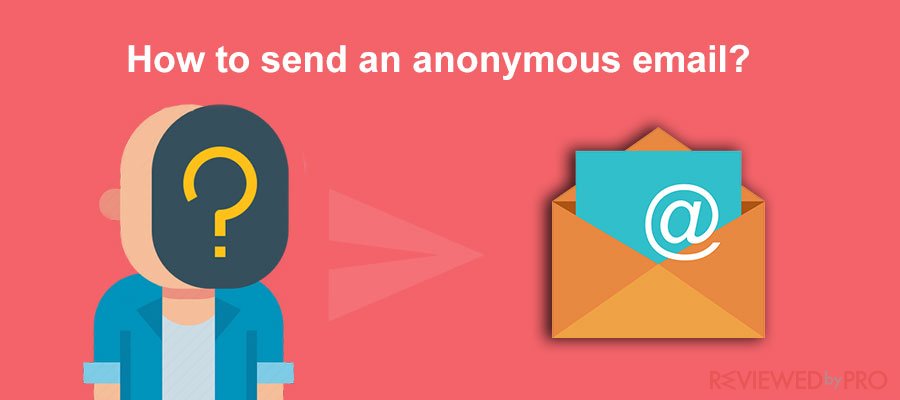
If you are thinking about sending sensitive information over the email without being traced, then doing it normally is not enough. The primary aim of email is to ensure an end to end communication, but most providers will not guarantee privacy. That said, there is a way around this. Let us give you a few tips and tricks on how to send and receive anonymous mail.
Why you may want to send an anonymous email
1. Whistleblower
Whistleblowers are often at risk in their quest for justice. Usually, target parties would profile them. They can try to get them sacked from their jobs, take legal action, bully them, harm, or even cut their lives short! Therefore, anonymity is certainly a suitable line of defense for whistleblowers.
2. Journalists
Journalists can uncover dirty secrets that may taint the reputation of big institutions, government, or personalities. Some powerful institutions and people will often track down these journalists. If you are a journalist, you do need a secure way to source information and deliver them under the radar. You can use an anonymous emails to communicate and protect your identity.
3. To Avoid Spam and Tracking
Successful internet marketing campaigns require data and you are a potential customer. It is common for companies and spammers to collect email addresses and flood your mail with marketing content. When you agree to prompts from various websites to log in using your email account, know you are giving out invaluable information. Your data is likely being shared with third parties. If you notice that you are specifically targeted by ads popping up, then you have likely given out your privacy information!
The bottom line is that an anonymous email will help you protect your privacy. Let us now delve in deeper on simple ways you can start sending anonymous emails.
How to send an anonymous email?
1. Create a new email account
Creating a new email account is the easiest way to send an anonymous email. Yes, what you have to do is to create an email address via email providers such as Yahoo or Gmail albeit while faking your personal information. Just fake anything that can lead to being traced. You can fake your real name, home address, D.O.B, and phone number among other details.
It is not uncommon to be prompted by some of the email providers to provide your real phone number for a verification code. Just be cautious when dealing with such scenarios. The downside of creating a new fake email account to send an anonymous email is that the service providers can still track your IP address. This information can be used to retrieve your personal information, especially by government agencies. To avert this, you can integrate your new account with Virtual Private Network (VPN) to hide your location.
2. Leverage a Burner email
A burner email account, as the name suggests, will let you send or receive emails without disclosing your identity and then “burns out.” In other words, the burner email destroys itself or simply expires after a given time and cannot be accessed thereafter. Others allow you to send or receive the email without necessarily creating an account that connects to you. You can try using various send-only accounts like AnonymouseMail or receive-only anonymous email services such as Mailinator. What these services do is that they use their public addresses to send or receive your email messages. That said, a burner email does not fully shield you because your IP address can still be traced by these service providers. It is still recommended that you make use of a VPN when using a burner email.
3. Use Encrypted Email
The basic difference between encrypted and normal email services is protection. The encrypted service encrypts your email and contact list. This way, anyone trying to eavesdrop can’t read your email or obtain any valuable data from it. If you do a bit of research, you will find email providers that offer several features, including anonymous payments or even self-destructing emails.
Although your information is encrypted, one drawback is that the service providing company can still trace your IP address. What do law enforcement agencies need to unlock most of your data? Well, don’t do anything illegal as the IP address could be enough for them to derive your hidden information. Again, you should use an encrypted email service with a VPN.
Tip: Always Use a VPN!
As you have seen from the previous solutions, each one of them requires that you use a VPN alongside it. You can hide all the necessary information about you in whatever anonymous option you choose. However, these emails have an attached IP address, which can be used to reveal the identity you tried to hide in the first place. Using a VPN is simply redirecting your traffic through a VPN server so that your IP address takes that of the VPN server.
In a nutshell, anyone who tries to trace you via the IP address will get the VPN’s server IP address, which isn’t helpful to them.
As a rule of thumb, though, avoid free VPN services! This is because most will tend to log your activity, and broker deals with third parties using your data. It is good to go for trusted VPN providers who have strict no-log policies. These providers don’t store any information about whatever you do over the internet. You can thus send your anonymous emails with the utmost protection!
Extra private email tips
Although the tips above are good to get you going, let us give more tips to solidify your privacy as you send an anonymous email:
- Avoid using similar passwords when creating a new email account.
- Keep the login credentials for the anonymous account safe.
- When creating any anonymous email account, avoid providing any details that may be used to trace you.
- Avoid using the anonymous email account to access other services like Facebook, and Twitter, among others.
- If possible, avoid using home networks while sending anonymous emails. Even if you are using a VPN, just go for public networks.
- Always check that your VPN is working before logging in to your anonymous email account.




